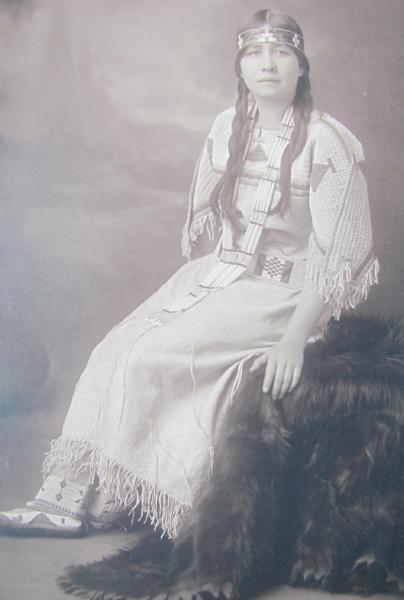- Ella Cara Deloria
- Ella Cara Deloria
Contributed to
-
The heyókȟa who dreamed of his death (1887)
The heyókȟa are respected and revered. This is a tale of a one who knew how he would die, and painted himself and his horse in the manner of the lightning strikes that would kill them. Bushotter once experienced someone being struck by lightning too.
-
Deer women (1887)
A wandering hunter is seduced by the most beautiful woman, only to discover too late that she is a deer-woman who sends him insane. Since then, people say such spirits roam the wilds, luring men to ruin through their irresistible looks.
-
Plum-stone game (1887)
The plum-stone game is primarily a game for women. Stones will be painted or marked on one side, while the other side is left plain. The stones will be laid mark-side-down in a birch-basket and after the toss, the marked sides are counted for the score.
-
The man who could understand ravens (1887)
A man was said to understand the speech of ravens and magpies, which brought him exciting messages. Eventually the people taught a raven to speak, and that is why ravens can be taught like parrots to mimic human speech.
-
Beliefs about day and night (1887)
People don't know what causes night and what causes day, aside from the sun. It is something mysteriousness and awe-inspiring, which is why night and day are considered sacred.
Mentions in the recordings
-
Ella Deloria Y.W.C.A. Uŋ Oíhdaka
Ella Deloria talks of her work with the Y.W.C.A.
in
-
Miss Deloria All Saints School, Sioux Falls, én thokáheya wayáwa nakúŋ Oberlin College, Ohio, hehán Colombia University, New York, etáŋhaŋ wóuŋspe ihúŋnikiye.
Miss Deloria went to school at All Saints in Sioux Falls, and is a graduate of Oblerin College, Ohio, and Columbia University in New York.
in
-
Kʼa Miss Deloria táku thokáheya čhažéyate čiŋ hé wikhóške ičháǧapi hená hékta khúŋšitkupi thawíčhoȟʼaŋpi, wóuŋspe, oíhduhe kʼa wíyukčaŋpi kiŋ kičhí íčhithokeča oyáka.
The first thing Miss Deloria mentions is that she is talking about today's young woman, whose generation differs from their grandmothers' in work, education, behavior, and beliefs.
in

